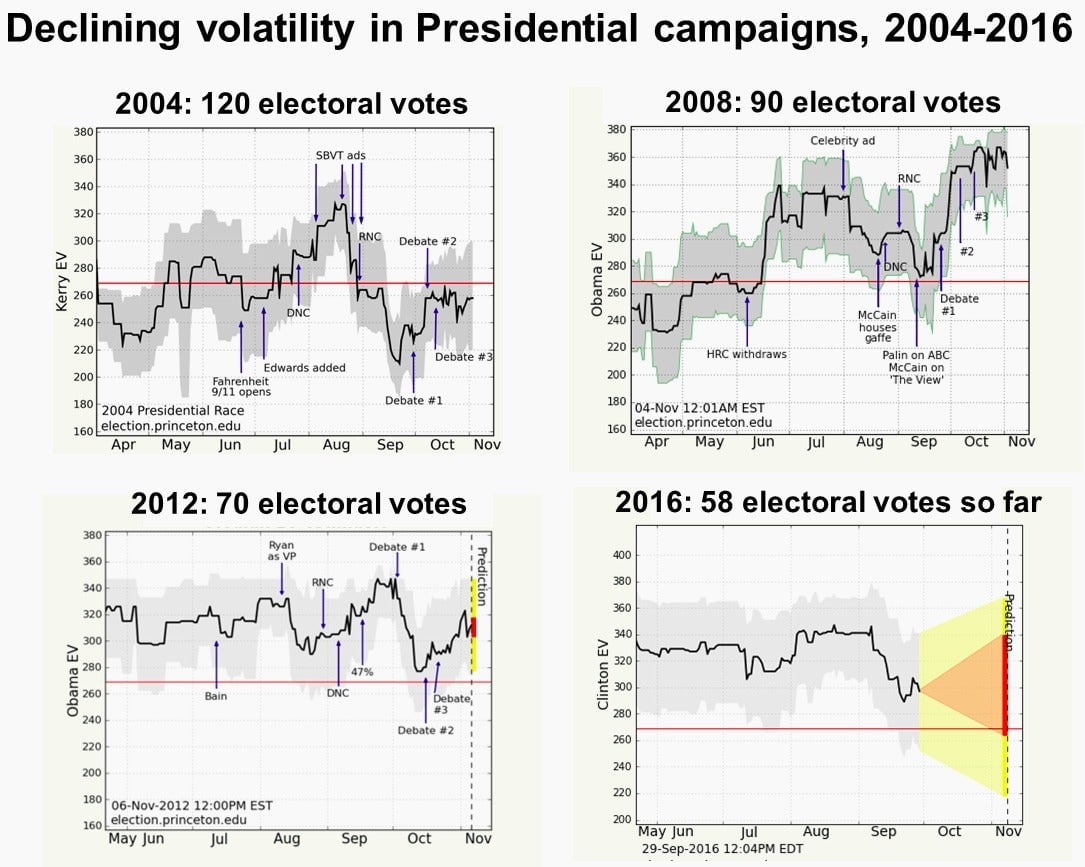The boring truth about the out-of-control 2016 election? It’s the least volatile in years
Despite the reported “tawdriness” of last night’s presidential debate, the presence of a sex tape-obsessed TV star and a war within the Republican party, don’t believe what you hear: The 2016 presidential race is actually the least volatile in the past sixteen years, and Republican candidate Donald Trump has never come close to holding a lead in the general election.


Despite the reported “tawdriness” of last night’s presidential debate, the presence of a sex tape-obsessed TV star and a war within the Republican party, don’t believe what you hear: The 2016 presidential race is actually the least volatile in the past sixteen years, and Republican candidate Donald Trump has never come close to holding a lead in the general election.
Since public opinion polls offer a noisy snapshot of where individuals stand at a given time, the only way to responsibly analyze them is to look at an average over time. Though occasional polls have found a lead for Trump, the vast majority do not. From that point of view, the trend is a stable five or six point lead for Democratic candidate Hillary Clinton, as measured by major poll aggregators. That’s a larger lead than Barack Obama carried over Mitt Romney at any point in the last month of the 2012 election.
This year’s race has also seen less volatility in terms of expected electoral vote outcome, compared to elections in 2004, 2008 and 2012. Sam Wang, a statistician and professor of neuroscience at Princeton University, has been tracking election data since 2004. He gathers state-level polls in an effort to forecast the outcome of their votes in the Electoral College, which awards the presidency. Wang’s current forecast is that Clinton will 326 electoral votes to Trump’s 212.
It’s hardly an outlier: Respected University of Virginia forecaster Larry Sabato expects a 341 to 197 victory for Clinton, while the modelers at FiveThirtyEight say 331 to 206.
Wang notes that his forecast has varied little over the last year. In 2004, we saw expected outcome swings across 120 electoral votes; this year, we’ve seen them across only 58, without Clinton ever dipping into the loss column. Here’s a chart Wang made at the end of September to compare the last four elections:

The explanation for relatively steady opinion is simple: The US electorate has been sorted fairly effectively by ideology over the last second decades, and the two main parties offer strikingly different platforms to voters.
For all the wishful thinking about a strain of populism bursting across party lines, the vast bulk of Bernie Sanders supporters have lined up behind Clinton because she shares their view that government can be a force for good in the world. And why hasn’t all-establishment Speaker of the House Paul Ryan abandoned Donald Trump, for his various apostasies from the conservative party line, or even his sexual assault brags? Because the builder is still committed to lower marginal tax rates.
It’s possible, of course, that this election may be a harbinger of future realignments, with the growing split between college-educated Republicans and the rest of their party attracting lots of attention. It’s also possible that some hacked e-mail or leaked video changes the course of the election. But it’s more likely that voters will react to future news events the same way many reacted to Trump’s most recent outrage: It didn’t change their opinion.
The truth about this election? Clinton is winning it.